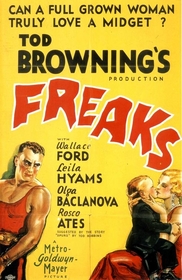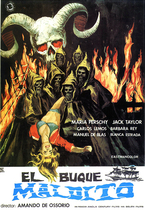Our editor-in-chief Nate Yapp is proud to have contributed to the new book Hidden Horror: A Celebration of 101 Underrated and Overlooked Fright Flicks, edited by Aaron Christensen. Another contributors include Anthony Timpone, B.J. Colangelo, Dave Alexander, Classic-Horror.com's own Robert C. Ring and John W. Bowen. Pick up a copy today from Amazon.com!
Freaks (1932)
Freaks, Tod Browning's peek behind the curtains of a circus sideshow, was greeted with disgust and outrage on its initial release1 due to its unflinching portrayal of disability, as well as its gruesome ending, (and was not helped by the lurid title and marketing campaign – "Can a full grown woman truly love a MIDGET?"). MGM quickly disowned the film, letting it sink into semi-mythical obscurity, but the last 40 years or so have seen a massive upswing in both the popularity and reputation of Freaks2. If you can look past its notoriety, it paints a largely compassionate picture of the title characters, and has an amazing and inflammatory message of the downtrodden and mocked violently getting one up over the beautiful people.
The plot is straightforward melodrama; Hans, a dwarf working at a 1930s European circus, falls in love with Cleopatra, a beautiful "normal" sized trapeze artist. Despite agreeing to marry him, she is only interested in two things – the large inheritance he's about to receive, and her lover Hercules, the circus strongman. After Cleopatra very publicly humiliates Hans at their wedding, a group of his colleagues band together to take a brutal and grisly revenge on her.
The script, loosely based on a short story called "Spurs"3, sticks to the basic humiliation/revenge plot, but makes one important deviation from the source material. In "Spurs", the dwarf character is a loner, hated by the rest of the circus performers, and he carries out his revenge with only the aid of his pet dog. In the film, Hans is a popular character, and it is his friends who then work together to avenge him. This change is crucial, and gives Freaks its most important theme; that of a group of people banding together against a society that only wants to deride and reject them.
Browning forgoes elaborate make-up and special effects, and instead draws on his own background working in circuses to cast real life sideshow performers with a wide variety of physical conditions. These include dwarves, a bearded lady, a woman with no arms, a man with no arms or legs, the insensitively nicknamed Pinheads (the scientific term is microchephalics, a condition in which the circumference of the head is smaller than normal because the brain has not developed properly), and people who had no formal medical condition, but were just ugly.
The first half of the film is taken up with scenes of the characters and their day to day life; we see them eating, drinking, doing the washing, showing off their new born children, and in an amazing scene with the armless and legless "Human Slug" Prince Randian, lighting and smoking a cigarette. All rather normal, and not always totally scintillating to watch, but it does make the point that "they" are deep down no different from "us". However, other themes and events in the film show that the Freaks definitely do at least think of themselves as being different and isolated from the rest of the world and its morality.
Both the "normal" people and the Freaks themselves constantly reinforce this separateness. Animal references abound in the script, sometimes as insults (at various points Hans is called a bug, an ape, and a polliwog), or as one of the performers many creature related monikers (Bird Women, Turtle Girl). This all serves to emphasize the idea that, in society's view, whatever the Freaks are, they are not human. The Freaks' language at the wedding party, with their chant of "We accept you, one of us" also underlines the way they see themselves as a distinct and separate group of people. An interesting footnote to this are the real life tales of the cast getting sucked into the Hollywood dream, thinking they would be rubbing shoulders with the stars, only to find themselves barred from the main studio canteen. Instead, they were made to eat on picnic tables far away from the rest of the MGM workforce, in a direct mirror of the isolation suffered by the characters they were playing in the film.4
This sense of difference is also apparent in some of the sexual behavior in the film, which, while never explicit, hints at things that certainly breach the Hays Code, the censorship guidelines of the day5. For a start, the dwarf Hans is lusting after a "normal" woman like Cleopatra. Although he wants to do the "decent" thing and marry her, he will presumably want to consummate the wedding at some point. At the wedding party, he is publicly humiliated, and symbolically castrated by his new wife kissing her lover Hercules right in front of him and the other guests. It is also worth noting that in the original script, instead of being murdered, Hercules was castrated, a much more appropriate punishment, given his cuckolding of Hans.6
There is also the clown, Roscoe, who is married to one of the Siamese Twins, and is presumably sharing his marital bed with his sister-in-law. There is a further kinky twist to this with the suggestion (without any scientific basis) that physical sensations felt by one twin can also be felt by the other, with the obvious implications this has for the bedroom. The real point to all of this, beyond titillating the audience, is the fact that none of the performers think anything strange of any of this, which seems to emphasize their complete rejection of "normal" society as it was then, along with its rules and ethics.
The climax of the film is audacious, thought provoking and chilling, as, after all the effort expended to get us to think of the Freaks as being human and sympathetic, they are now portrayed as utterly inhuman. You can see this both in their appearance, silently slithering through the mud and rain, illuminated mostly by flashes of lightning, and in the horrifying violence they inflict on Cleopatra. We don't actually see the attack, only the end result, with their victim left covered in feathers, her hands mutilated so that they resemble chicken feet, and her vocal chords wrecked so she can only squawk like a bird. The message from the Freaks is that if she sees "us" as animals, then making her "one of us" will be the ultimate revenge.
This is a brave move, as having spent much of the film getting the audience to feel some sympathy for the Freaks, Tod Browning now forces us to ask some disturbing questions. How far are we prepared to take that sympathy? Do we think they are in any way justified in their behavior? Can we identify with their thoughts of murderous revenge? There are no scenes of anybody being brought to justice or paying any kind of price for the act of violence, so with the director refusing to make any moral judgments, we have to provide the answers ourselves.
Freaks was a critical and box office disaster for MGM, and they couldn't wait to get rid of it, selling the rights to exploitation producer Dwain Esper (of Maniac and Reefer Madness fame), who took it round his roadshows under various titles such as Nature's Mistakes and Forbidden Love. It soon sank into obscurity until the sixties, when college campuses and art house cinemas began to revive it7, and this may have some connection to the fact that, by then, the word Freak had acquired new connotations for a generation feeling alienated from mainstream society. Every generation has individuals who either fall short of, or have no interest in society's standards and ideals, and perhaps some of these people may see something they can relate to, in their kindred spirits, the Freaks.
1 http://www.olgabaclanova.com/the_making_of_freaks.htm
2 www.rottentomatoes.com/m/freaks
3 http://www.midnightpalace.com/Spurs.pdf
4 Skal, David J. Audio Commentary. Freaks. DVD. Warner Home Video, 2004.
5 http://www.artsreformation.com/a001/hays-code.html
6 Skal









I think part of the problem
I think part of the problem with this movie is that the hero is a jerk! The first time you see him, he's openly leering at the trapeze vamp ("stick your tongue back in your mouth!" snapped my wife). He treats the poor sweet midget girl in his act (who's clearly mad for him) like dirt, ignores the other freaks warnings, and generally gets what he deserves - in my humble opinion. (In other words, he behaves like 90% of us guys!)
Freaks is probably my
Freaks is probably my favorite Browning Film. Notwithstanding it's age, it is one of the few horror films of the 1930s that still "works" as it was originally intended. Your discussion of the film's societal standards and ideals reminds me of another bizarre film which I recently came across: Werner Herzog's "Even Dwarfs Started Small" (1970) - while not exactly a horror film, there are elements which are similar to Browning's film which should be of interest to anyone who enjoyed Freaks.
"Even Dwarfs..." sounds
"Even Dwarfs..." sounds fascinating, and I will try and track down a copy. It sounds like a simillar "us against them" theme. I have only seen "Fitzcarraldo" and "Grizzly Man" and both were individuals (or rather the will of an individual), rather than groups, versus nature/society. One ends in triumph and one ends in the worst kind of failure.
I don't see Hans as the hero
I don't see Hans as the hero of the piece at all. Frozo, Johnny Eck, but not Hans. He's a hapless schnook.